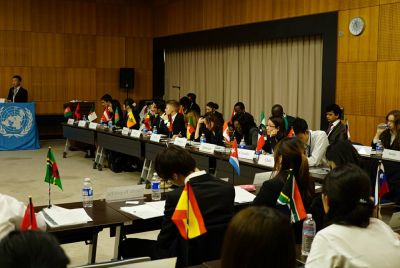TSUKUBA FUTURE
#065 Setting Up a Tsukuba-Style Model UN from a Linguist's Perspective
Associate Professor KIDA Tsuyoshi, Faculty of Humanities and Social Sciences

There are calls in Japan for the study of English education to commence at an earlier age, and for an increase in the number of English-language lectures in universities. The significance of learning English, the international lingua franca, is clear, but to what extent is it possible to master a foreign language? Linguistic ability and the mastery of communication are the gateway to achieving globalization. Prof. Kida has utilized his research into mastering a second language to redesign the Model UN, a project which is already bearing fruit.
How is a person's native language determined? It is common knowledge that children naturally learn to speak before they are around three years old, but in actual fact language acquisition commences during pregnancy. In the womb, the child's entire body feels and internalizes the intonation, tones, grammar and even content of the mother's speech, and the speech of those around her. After birth, the child is influenced by the linguistic and cultural environment in the home and the community. According to Prof. Kida, a language is not simply a tool for exchanging information, it is a part of a person's identity. It is argued that in education, particularly in the realm of logical content such as mathematics, lessons are more effective if they are taught in the language used in the home and the surrounding community.
After graduating from high school, Prof. Kida studied architecture in France, an idea triggered by a school friend who also wanted to study in that country. His experience of mastering French aroused his interest in linguistics, and this became the subject of his eventual doctoral thesis. When acquiring a second language, one is heavily influenced by the tangible and intangible psychosocial environment, and this is reflected in motivation. The research field known as neurolinguistics has demonstrated the relationship between psychological disorders and the development and loss of linguistic ability. The native language also influences second language acquisition. Speakers of European languages make grammatical errors when they study English, but acquire the ability to speak relatively quickly, whereas speakers of Asian languages take longer to start speaking but master the grammar accurately. Closely related languages cause a different kind of interference. When a Spanish speaker studies Italian (or vice versa), there is a tendency to transfer knowledge of the native language directly to the acquired one, making it difficult for the learner to master the subtle differences between the two languages. However, non-linguistic aspects such as gestures and timing are also significant, so it is important to determine the position of a language within the overall communication culture.
Prof. Kida has run the Model UN as a university module every year since 2012. The Model UN, started in the US in the 1950s, is an event in which participants take on the role of representing the member states of the UN and thus learn negotiating and debating skills. It has spread round the world and is also very popular in Japan. Many Japanese schools organize Model UN events as part of their English communication courses. Prof. Kida has created a unique Tsukuba-style program based on his expertise in second-language pedagogy, under the title of Tsukuba English Model United Nations (TEMUN). After analyzing which skills are required for global human resources, Prof. Kida designed the program by looking for ways to utilize the unique qualities of the University of Tsukuba and by examining motivation and other factors.

TEMUN Conference?suited participants each represent one country
The TEMUN program is a two-day conference preceded by three half-day preparatory lessons. Participants are graduate and undergraduate students, and high school students are also able to join in. The mix includes mature students, international students and students from other universities. The diversity of the participants, including many students studying in science fields, highlights the openness of the university, the low barriers between disciplines at the university, and is a resource of which Tsukuba is extremely proud. In the preparatory lessons, typical expressions used at international conferences are learned, and background knowledge relevant to the items to be discussed at the conference (the agenda) is imparted. Each year, themes discussed at the actual United Nations are selected. At other Model UNs, participants may not represent their own countries so as to maintain equality. However, at TEMUN, this ban has been lifted in order to utilize the strength of having international students from numerous countries. Each year, we strive to have approximately one third of the 60 participants representing their own countries. This heightens motivation as they are representing countries into which they have a special insight. Prof. Kida reports that it is a pleasure each year to see students, who were nervous during the preparatory sessions, debating issues at the conference with great confidence. He also admits that he would love to participate as a country representative.
This unique TEMUN format has garnered attention both in Japan and around the world. Prof. Kida aims to set up a system which will allow a TEMUN session with 100 participants, and is preparing to publish his research findings around the world.
TEMUN final resolutions are often sent as feedback to the UN institutions from which the agendas were borrowed.


